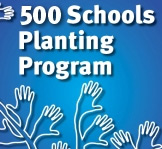Ever wondered what happens after you flush? If you live in an urban area then your waste will disappear down the pipes and you will probably not give it any further thought. Most likely your waste will travel to a Sewage Treatment Plant (STP), then eventually it will end up back in our waterways. For most of the 15 or so STP’s in Western Sydney, the water will return from whence it came – back in the Hawkesbury Nepean Catchment as tertiary treated sewage.
We recently had a fantastic day with Cherrybrook Technology High School and their Year 11 Geography Class at the Rouse Hill Recycled STP. These lucky students have a fantastic teacher who has organised a series of excursions looking at Biophysical Interactions pertaining to water. They came to us for a River Ecology day and tested the health of the Hawkesbury river a few months ago, then we went further upstream to look at the source of all the nutrients we found in the river – the STP at Rouse Hill. Rouse Hill is quite unique in that it recycles a large percentage of water back into the township via the purple pipes to water gardens and flush toilets.


This is a MUST DO excursion for all students and it certainly improved my knowledge and water waste awareness. Download the Sydney Water Excursion Program flyer or contact us to arrange one for you. Students began by interacting with a working catchment model to see how farming and urban water practices can alter runoff into our waterways.
They then discovered what can and can’t go down the toilet! Toilet paper and excrement is fine – just about everything else is not. The flushable toilet wipes turned out to be not so flushable after all.
Someone at the STP has the gruesome job of de-clogging the filters of this waste – so think of them when next you flush! No plastics, tissues or other stuff down the toilet!
This slideshow requires JavaScript.
There are alternatives to mass waste treatment of course….
If you live without connected sewage like here at Brewongle and at my home, then waste disposal is a big issue.

We have a fantastic worm farm waste system at my house and a similar system operates here at work. ALL waste (yes including the brown stuff!) goes into a large worm farm composting system. The worms have a great time devouring this as well as our food compost. The product is nutrient rich water that has been cleaned by worms. We then pump this under our gardens for healthy plants! Are more of these the answer to our waste problems in urban areas?








































